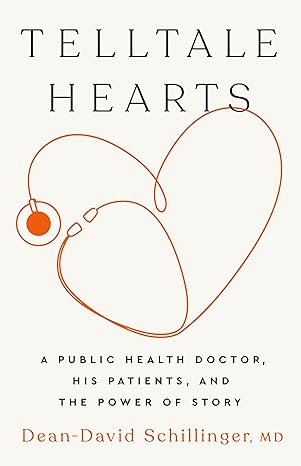
Telltale Hearts: A Public Health Doctor, His Patients, and the Power of Story
By Dean-David Schillinger
Telltale Hearts: A Public Health Doctor, His Patients, and the Power of Story begins with Dr. Schillinger discussing his deep depression and how through therapy—specifically, his therapist encouraging him to tell the psychiatrist his story—that he not only was able to get out of his depression, but Dr Schillinger came away with a profound insight into his relationship with his patients.
Or, as he put it, “This book reveals what my patients have taught me that the combination of stories and science holds the key to recovery.” He called this epiphany “narrative epidemiology,” which he believed could transform health care.
He specifically mentioned the work that John Snow did back in England during the Nineteenth Century. Snow is considered the first epidemiologist for his work discovering the cause of the cholera outbreak in London and coming up with a simple explanation. His solution, after extensive investigations including talking to victims and those who had not been affected, he was able to discern why some were infected and those who were not. His solution was simple: remove the handle of the Broad Street Pump where most of the victim’s had gotten their water. As a result, the number of cholera cases declined.
With this set up in mind, I had expected that most of the book would be the stories of individual patients and how Dr. Schillinger was able to help them, and for the most part it was, but what I wasn’t expecting was a very detailed discussion of working on the problem of the rising number of diabetes cases in the community as a diabetes czar in California.
If I have any complaint about the book, it is the fact that his work as the diabetes czar takes up a good portion of his book and he wrote what I would deem to be unnecessary details. For instance, was it necessary to publish that many poems or his efforts in getting a sugar sweetened beverage tax to be placed on the ballot? I am sure there are those who would find all this quite interesting, but it took up a third of the book, which I felt detracted from the overall focus of the book.
I also found that some of his tangents, even when the patient narratives were fascinating, sometimes detracted from the overall enjoyment of the book because they really did not add all that much.
I would recommend this book to anyone who is interested in patient narratives, and I would also recommend this book to anyone who is interested in the public health system and how to go about making effective changes.
4/5 stars
[Thank you to NetGalley and the author for the advanced ebook copy in exchange for my honest and objective opinion, which I have given here.]
